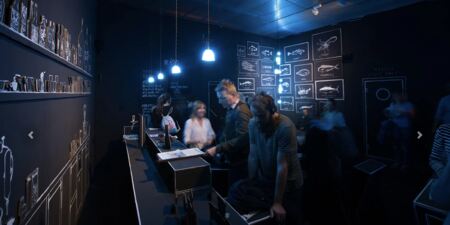
Ars-Electronica-Straße 1
4040 Linz
Österreich
Ars Electronica
Ars Electronica has accompanied the ongoing digitalization of our lives since 1979. It poses questions about the political, social, ecological, and economic consequences, and speculates on the future forms that technological progress will take. Embedded in a worldwide network of artists, scientists, developers, designers, entrepreneurs, and activists, Ars Electronica constantly advances this research – both within and together with the widest possible public. Whether with exhibitions, conferences, concerts, performances, or interventions – the goal has always been to push forward a discourse and promote inclusive and sustainable visions of the future.
A new festival. The first Ars Electronica begins on September 18, 1979. 20 artists and scientists from all over the world gather at this new “Festival for Art, Technology and Society” in Linz to discuss the Digital Revolution and its possible consequences. This Ars Electronica is small, but groundbreaking. The initiative for this came from Hannes Leopoldseder (AT), director of the Upper Austria regional studio of the Austrian Broadcasting Company (ORF), who is passionate about everything that has to do with the future. Together with the electronic musician Hubert Bognermayr (AT), the music producer Ulli A. Rützel (DE) and the cyberneticist and physicist Herbert W. Franke (AT), he lays the foundation stone for a festival that will become the world’s largest and most important of its kind.
For digital humanism. With Machine Learning and Co, we are initiating the transition from automation to autonomy today. The digital becomes independent for the first time. On the threshold of this new era, we must set the course for our digital society to remain committed to fundamental values such as human dignity, freedom, democracy, equality, the rule of law and human rights. Together with artists, scientists, developers, designers, entrepreneurs and activists from all over the world, we want to contribute to such a digital humanism.
Since 1979 we celebrate once a year the Ars Electronica Festival. More than 1,000 artists, scientists, developers, designers, entrepreneurs and activists are coming to Linz, Austria, to address central questions of our future. For five days, everything revolves around groundbreaking ideas and grand visions, unusual prototypes and innovative collaborations, inspiring art and groundbreaking research, extraordinary performances and irritating interventions, touching sounds and rousing concerts.
Since 1987 we have been awarding the Prix Ars Electronica every year. With several competition categories, we search for groundbreaking projects that revolve around questions of our digital society and rehearse the innovative use of technologies, promising strategies of collaboration and new forms of artistic expression. The best submissions will receive a Golden Nica, considered by the global media art scene to be the most traditional and prestigious award ever.
Since 1996 we have been working at the Ars Electronica Center year after year with tens of thousands of kindergarten children, pupils, apprentices and students on questions concerning the ever-increasing digitalization of our world. The focus is on the potential of the next Game Changer: Artificial Intelligence.
Also since 1996 we operate the Ars Electronica Futurelab, whose international and interdisciplinary team of artists and scientists is researching the future. With interactive scenarios, we prepare central aspects of the Digital Revolution for the general public in order to initiate a democratic discourse.
1998 we initiated create your world. The year-round programme is developed together with young people and includes a competition for under 19 year olds, a festival of its own and a tour through the region. We see create your world as an invitation and challenge at the same time and want to encourage young people to leave the role as mere users of technology behind, to discover new possibilities of acting and designing and to implement their own ideas.
2004 we started Ars Electronica Export with a big exhibition in New York. Since then we have been to Abuja, Athens, Bangkok, Beijing, Berlin, Bilbao, Brussels, Buenos Aires, Doha, Florence, Kiev, London, Madrid, Mexico City, Moscow, Mumbai, Osaka, Sao Paulo, Seoul, Shanghai, Singapore, Tokyo, Tunis, Venice and Zaragoza. Together with partners from art and culture, science and education, business and industry, we organize exhibitions and presentations, conferences and workshops, performances and interventions at all these locations.
Since 2013 our team at Ars Electronica Solutions has been developing market-ready products inspired by visions and prototypes from the artistic cosmos of Ars Electronica. We develop innovative, individual and interactive products and services for exhibitions, brands, trade fairs and events.
Since 2016 we are active all year round in Japan. Especially in Tokyo and Osaka we work together with leading Japanese universities, museums and companies, develop and present artistic projects, design workshop series and Open Labs and dedicate ourselves to the future of our digital society in conferences.
In order to actively shape the digital revolution, people are needed who have a feel for change and recognize connections, develop new strategies and set a course. This is precisely where the 2019 created Future Thinking School aims to support companies and institutions.
Whether at home in the living room or in the office, whether in the classroom or in the lecture hall, in the streetcar or subway, on the train – from everywhere Home Delivery accompanies our virtual visitors on an artistic-scientific journey into our future since 2020.
All our activities since September 18, 1979 have been documented in the form of texts, images and videos and stored in the Ars Electronica Archive. This archive provides us with a unique collection of descriptions and documentations of more than 75,000 projects from four decades of Ars Electronica.